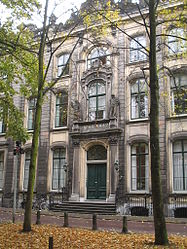Hoge Raad der Nederlanden
| Supreme Court of the Netherlands | |
|---|---|
| Hoge Raad der Nederlanden | |

Hoge Raad, Lange Voorhout, The Hague
|
|
| Established | 1 October 1838 |
| Country | Netherlands, Curaçao, Sint Maarten, Aruba |
| Location | The Hague, Netherlands |
| Coordinates | 52°5′0.52″N 4°18′41.85″E / 52.0834778°N 4.3116250°ECoordinates: 52°5′0.52″N 4°18′41.85″E / 52.0834778°N 4.3116250°E |
| Composition method | Selected by the House of Representatives on advice of the Supreme Court and appointed by royal decree. |
| Authorized by |
Constitution of the Netherlands Statute of the Kingdom of the Netherlands |
| Judge term length | Life tenure with mandatory retirement at the age of 70. |
| No. of positions | Varies (currently 36) |
| Website | www |
| President of the Supreme Court | |
| Currently | Maarten Feteris |
| Since | 1 November 2014 |
The Supreme Court of the Netherlands (Dutch: Hoge Raad der Nederlanden pronounced [ˈɦoːɣə raːdɛr ˈneːdərlɑndə(n)], literally "High Council of the Netherlands") is one of the highest courts of the Netherlands, Curaçao, Sint Maarten and Aruba. The Court was established on 1 October 1838 and sits in The Hague, Netherlands.
The Court is the court of last resort for civil and criminal matters. In certain administrative cases it has final jurisdiction as well, while in other cases this jurisdiction rests with the adjudicative division of the Council of State, the Central Appeals Tribunal (Centrale Raad van Beroep), the Trade and Industry Appeals Tribunal (College van Beroep van het bedrijfsleven) as well as judicial institutions in the Caribbean part of the Kingdom of the Netherlands. The Court is a court of cassation, which means that it has the competence to quash or affirm rulings of lower courts, but no competence to re-examine or question the facts. It only considers whether the lower courts applied the law correctly and the rulings have sufficient reasoning. In so doing it establishes case law. According to Article 120 of the Constitution, courts may not rule on the constitutionality of laws passed by the States General and treaties. With the exception of constitutional Court of Sint Maarten courts (which rules on constitutionality with regards to the Sint Maarten constitution only) have thus no competence for judicial review with respect to the Constitution.
...
Wikipedia
